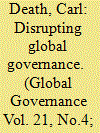| Srl | Item |
| 1 |
ID:
142209


|
|
|
|
|
| Summary/Abstract |
Disruptive protest by nonstate actors often accompanies global governance conferences, but little analysis has been devoted to disaggregating its diverse forms. This article identifies four types of disruptive protest— symbolic, procedural, coercive, and evasive—and illustrates them with examples from UN environmental conferences in Stockholm (1972), Rio de Janeiro (1992), Johannesburg (2002), and Rio de Janeiro (2012). Symbolic disruption in Stockholm contributed to the production of new discourses; procedural disruption in Rio in 1992 introduced new actors and texts; some protestors sought to directly and coercively disrupt the summit in Johannesburg; and protests in Rio in 2012 illustrate disruption through evasion and exit. Understanding the form and power of such disruptive protests is crucial for studies of global governance.
|
|
|
|
|
|
|
|
|
|
|
|
|
|
|
|
| 2 |
ID:
073434


|
|
|
| 3 |
ID:
081152


|
|
|
|
|
| Publication |
New York, Basic Books, 2007.
|
| Description |
xi, 544p.
|
| Standard Number |
9780465069040
|
|
|
|
|
|
|
|
|
|
|
|
Copies: C:2/I:0,R:0,Q:0
Circulation
| Accession# | Call# | Current Location | Status | Policy | Location |
| 053263 | 341.2/REY 053263 | Main | On Shelf | General | |
| 053646 | 341.2/REY 053646 | Main | On Shelf | General | |
|
|
|
|
| 4 |
ID:
107966


|
|
|
|
|
| Publication |
2011.
|
| Summary/Abstract |
This article explores the impact of time pressure on negotiation processes in territorial conflicts in the post-cold war era. While it is often argued that time pressure can help generate positive momentum in peace negotiations and help break deadlocks, extensive literature also suggests that perceived time shortage can have a negative impact on the cognitive processes involved in complex, intercultural negotiations. The analysis explores these hypotheses through a comparison of sixty-eight episodes of negotiation using fuzzy-set logic, a form of qualitative comparative analysis (QCA). The conclusions confirm that time pressure can, in certain circumstances, be associated with broad agreements but also that only low levels of time pressure or its absence are associated with durable settlements. The analysis also suggests that the negative effect of time pressure on negotiations is particularly relevant in the presence of complex decision making and when a broad range of debated issues is at stake.
|
|
|
|
|
|
|
|
|
|
|
|
|
|
|
|